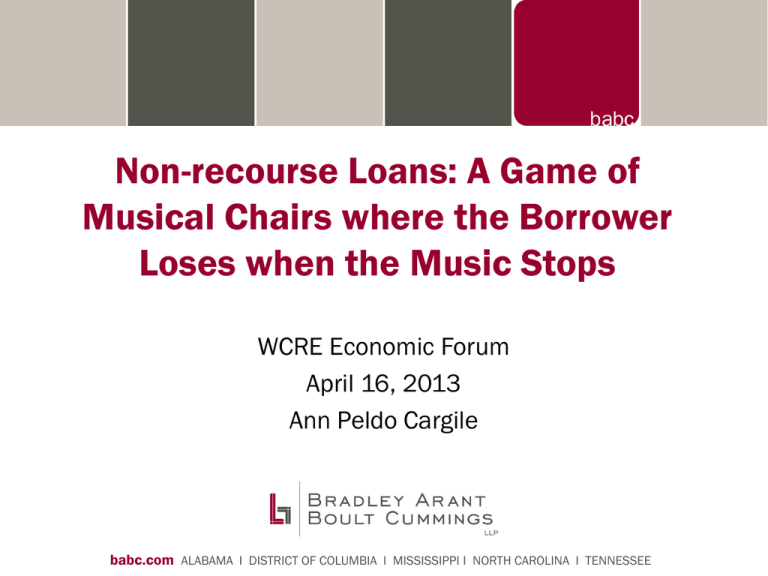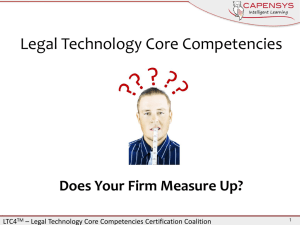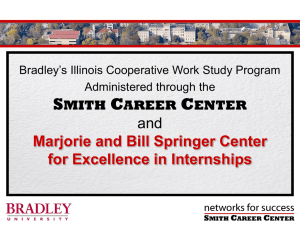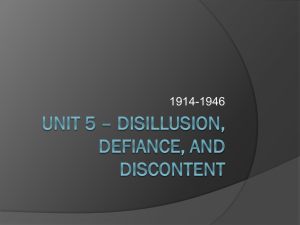Borrower shall be the subject of any petition or
advertisement

Non-recourse Loans: A Game of Musical Chairs where the Borrower Loses when the Music Stops WCRE Economic Forum April 16, 2013 Ann Peldo Cargile babc.com ALABAMA I DISTRICT OF COLUMBIA I MISSISSIPPI I NORTH CAROLINA I TENNESSEE Agenda What Is Non-recourse Debt? Recent Scary Case Law What to Fight about © 2012 Bradley Arant Boult Cummings LLP Non-Recourse Debt Lender underwrites the loan based solely on the value of the property and its income stream Lender agrees it will only look to the property for repayment The loan is “non-recourse” to the Borrower Theoretically, if the property does poorly, the Borrower can hand the Lender the keys and walk away © 2012 Bradley Arant Boult Cummings LLP Carve-outs BUT the Lender won’t accept certain risks related to the property: – Environmental problems – Bad acts of the Borrower • Fraud • Theft • Bankruptcy These are the “carve-outs” © 2012 Bradley Arant Boult Cummings LLP Carve-outs (cont.) The Lender will want a warm body liable for the carve-outs – a Guarantor © 2012 Bradley Arant Boult Cummings LLP Types of Carve-outs “Above the line” – Guarantor liable for damages only “Below the line” – Guarantor fully liable for the debt © 2012 Bradley Arant Boult Cummings LLP Really Scary Case Wells Fargo Bank, NA v. Cherryland Mall Limited Partnership (Michigan) Interrelation between Carve-outs and Special Purpose Entity (“SPE”) Provisions © 2012 Bradley Arant Boult Cummings LLP Standard Non-recourse Clause If a Default has occurred, Lender shall have full recourse to the Secured Property to secure any or all of the Obligations, provided that any judgment obtained by Lender in any proceeding to enforce such rights shall be enforced only against the Secured Property. © 2012 Bradley Arant Boult Cummings LLP Recourse Carve-out for SPE The foregoing restriction on liability shall not apply if Borrower shall violate [ANY OF THE SPE PROVISIONS] of this Deed of Trust. SPE provisions are specially designed to expedite the Lender’s ability to get control of the property if a bankruptcy is filed The is a “below the line” carve-out – full recourse for the debt © 2012 Bradley Arant Boult Cummings LLP SPE Clause Grantor is and will remain solvent and Grantor has and will pay its own debts and liabilities from its assets, as the same shall become due. Who would give back a property unless it were underwater? Why shouldn’t a Borrower use money from other sources to keep the property afloat? © 2012 Bradley Arant Boult Cummings LLP SPE Clause Grantor is and will remain solvent and Grantor has and will pay its own debts and liabilities from its assets, as the same shall become due. THIS IS A KILLER! – The loan becomes full recourse if the property is under water, or if the Borrower uses other resources to pay its debts © 2012 Bradley Arant Boult Cummings LLP Cherryland Results The language was clear But obviously this was not the intention of the parties Who won? THE LENDER! Guarantor was fully liable for a multimillion dollar deficiency © 2012 Bradley Arant Boult Cummings LLP Tennessee Law You think Cherryland is a hypothetical risk in Tennessee? TENNESSEE HAS HAD A HOLDING JUST LIKE CHERRYLAND! – Orix Capital Markets, LLC v. Wegener (Memphis) © 2012 Bradley Arant Boult Cummings LLP Is there a Fix? Michigan Act – (1) A post closing solvency covenant shall not be used, directly or indirectly, as a nonrecourse carveout or as the basis for any claim or action against a borrower or any guarantor or other surety on a nonrecourse loan. – (2) A provision in the documents for a nonrecourse loan that does not comply with subsection (1) is invalid and unenforceable. Ohio has a similar act. There was an identical bill presented to the Tennessee Bankers Association, but they chose not to sponsor it, and no bill has been filed. NO PROTECTION IN TENNESSEE! © 2012 Bradley Arant Boult Cummings LLP Other Carve-outs There are lots of other carve-outs to worry about even if you do not have a loan with SPE covenants! © 2012 Bradley Arant Boult Cummings LLP Other Carve-outs: Misrepresentation any misrepresentation of fact by Borrower – Could be a minor issue – Could be unintentional fraud or intentional misrepresentation of a material fact by Borrower © 2012 Bradley Arant Boult Cummings LLP Other Carve-outs: Waste any waste of the Secured Property – What if there is not enough money to prevent waste? any intentional waste of the Secured Property © 2012 Bradley Arant Boult Cummings LLP Other Carve-outs: Bankruptcy Borrower shall be the subject of any petition or proceeding for bankruptcy, reorganization or arrangement pursuant to federal bankruptcy law, or any similar federal or state law that remains undismissed for a period of sixty (60) days or more, or Borrower shall admit in writing that it is insolvent or unable to pay its debts when due Should the Guarantor be liable if this was an involuntary bankruptcy? Should the loan be full recourse or should the Lender only recover damages (above the line or below the line)? © 2012 Bradley Arant Boult Cummings LLP Other Carve-outs: Bankruptcy Borrower shall file or collude in the filing of any petition or proceeding for bankruptcy, reorganization or arrangement pursuant to federal bankruptcy law, or any similar federal or state law that remains undismissed for a period of sixty (60) days or more, or Borrower shall admit in a pleading to court that it is insolvent or unable to pay its debts when due Make sure this is an “above the line” carve-out, so that if the Lender suffers nothing more than delay, the Guarantor does not have full recourse liability © 2012 Bradley Arant Boult Cummings LLP Other Carve-outs: Admission of Insolvency Borrower shall be the subject of any petition or proceeding for bankruptcy, reorganization or arrangement pursuant to federal bankruptcy law, or any similar federal or state law that remains undismissed for a period of sixty (60) days or more, or Borrower shall admit in writing that it is insolvent or unable to pay its debts when due How do you start a conversation with a Lender about a workout without saying the Borrower is insolvent? Remember email is a writing © 2012 Bradley Arant Boult Cummings LLP Other Carve-outs: Admission of Insolvency Borrower shall be the subject of any petition or proceeding for bankruptcy, reorganization or arrangement pursuant to federal bankruptcy law, or any similar federal or state law that remains undismissed for a period of sixty (60) days or more, or Borrower shall admit in a pleading to court that it is insolvent or unable to pay its debts when due Make sure this is an “above the line” carve-out, so that if the Lender suffers nothing more than delay, the Guarantor does not have full recourse liability © 2012 Bradley Arant Boult Cummings LLP Other Carve-outs: Enforcement Costs costs of enforcing the Loan Documents Should the Borrower pay foreclosure costs even if it is not resisting? What if the Borrower has a valid grounds for complaint? costs of enforcing the Loan Documents in the event of an unsuccessful challenge by Borrower of Lender’s rights thereunder © 2012 Bradley Arant Boult Cummings LLP Other Carve-outs: Taxes and Insurance Borrower’s failure to pay taxes or insurance premiums or to obtain insurance as required in the Loan Documents What if the Lender has escrowed sums and won’t release them? What if there is no money to pay for these items? What if there is a receiver in place? © 2012 Bradley Arant Boult Cummings LLP Other Carve-outs: Taxes and Insurance (cont.) Borrower’s failure to pay taxes or insurance premiums or to obtain insurance as required in the Loan Documents, except to the extent that (a) the sums were escrowed with Lender; (b) the income from the Property after payment of debt on the Loan is not sufficient to pay such amounts; and (c) the obligation for such expense arises after Lender takes control of the Secured Property by receivership or other legal action. © 2012 Bradley Arant Boult Cummings LLP Why Is this Talk Important? Can’t my lawyer just handle it? – Recourse language is fixed at the commitment stage and often the lawyer is not asked to review the commitment – The practical consequences of this language are not always obvious: • On their face, the carve-outs look like liability only for bad acts • But the recession taught us these clauses contain numerous traps © 2012 Bradley Arant Boult Cummings LLP Why Is this Important? (cont.) It may be too late – Lots of closed loans have these problems! – It make cost you more to give the property bank to the Lender than you might think Lenders are starting to make loans again, so be aware of these issues © 2012 Bradley Arant Boult Cummings LLP What Should I Do? Never sign a commitment letter for a non-recourse loan without a thorough review of the carve-outs Make sure you read the carve-outs if you have a problem property © 2012 Bradley Arant Boult Cummings LLP QUESTIONS? babc.com ALABAMA I DISTRICT OF COLUMBIA I MISSISSIPPI I NORTH CAROLINA I TENNESSEE







